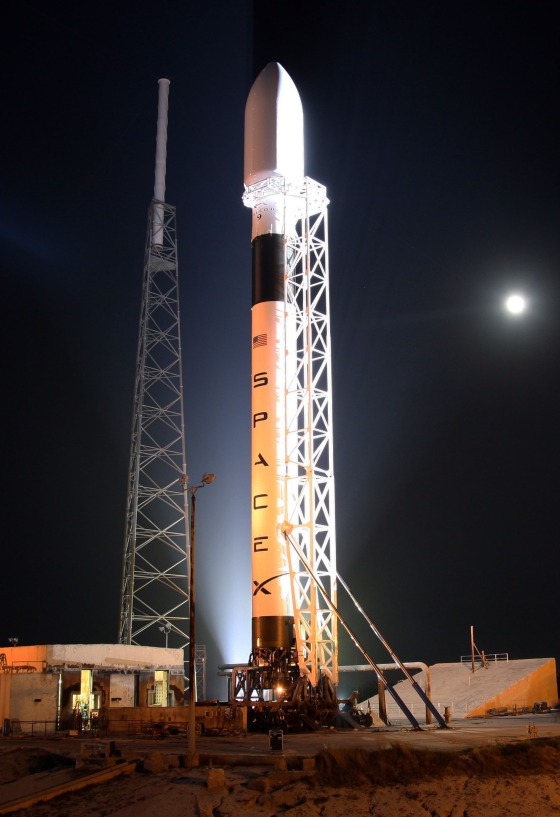Two of the debutantes on the final frontier - SpaceX's Falcon 9 rocket and the Planetary Society's Lightsail 1 solar sail - will be making their debut a bit later than planned. Another space newbie, the first in a new series of GPS navigation satellites, was finally launched after a couple of technical delays. Falcon 9: June at the earliestThe Falcon 9 is designed to carry cargo to the International Space Station for NASA at a fraction of the cost of a space shuttle flight. Someday, it may carry astronauts into orbit as well, if NASA's current vision for future spaceflight works out. As we discussed earlier this week, there are those (particularly on Capitol Hill) who worry that SpaceX and other commercial launch providers (even well-established companies such as Boeing and Lockheed Martin) won't be able to deliver safe, reliable space service. The success or failure of the first Falcon 9 demonstration could change the character of this multibillion-dollar debate. Liftoff is set to take place at Cape Canaveral Air Force Station in Florida, but the Air Force still has to sign off on SpaceX's flight termination system - basically, the "self-destruct button" that would have to be pushed if the launch goes awry. In the meantime, the Air Force had other space matters to deal with, such as the repeated delays in the launch of a next-generation GPS 2F-1 satellite atop a Delta 4 rocket. "Looks like the delay of the Delta IV GPS satellite launch has taken up a lot of resources at the Cape and in turn pushed the first test launch of Falcon 9 from May 28/29 to no earlier than June 2/3," SpaceX spokeswoman Emily Shanklin said in an e-mail to reporters. That Delta 4 was launched from the Cape on Thursday night, and on Friday, Shanklin sent a follow-up e-mail saying the Falcon 9 launch date was being delayed yet again: "Due to delays in the recent GPS satellite launch, Air Force range safety officials unfortunately did not have the resources to process our final documentation. SpaceX is now looking at no earlier than Friday, June 4, for its first test launch attempt." Space News has still more about SpaceX's anticipated launch schedule, including ... you guessed it ... more delays. Lightsail 1: Spring of 2011 at the earliestThe nonprofit Planetary Society says that development work on its solar-sail mission "is proceeding well." Lightsail 1 is destined to be launched into an orbit 500 miles (800 kilometers) above Earth, and then unfurl an 18.5-foot-wide array of reflective plastic panels. Solar radiation should propel the sail through space like a breeze on a kite.
David Imbaratto / Stellar Exploration for Planetary Society An artist's conception shows the Planetary Society's
Lightsail 1 solar sail in space.
The same principle is employed on Japan's Ikaros solar-sail experiment, which was launched last week and by all reports is still on track. The Planetary Society had hoped to launch Lightsail 1 by the end of this year, but today's update indicates that the timetable has been stretched out, with liftoff now set for no earlier than the second quarter of next year. That's no surprise: The society's executive director, Louis Friedman, signaled that there would likely be a delay when I chatted with him in March. Check out the full update for details about how Lightsail 1's design is being tweaked. More for space geeks
This has been a big week for space week, and not just because it's Geek Week on "The Rachel Maddow Show." We had a shuttle landing on Wednesday, the House hearing on space policy ... and to top it all off, the International Space Development Conference is under way in Chicago. I'm not able to attend this year, but you can keep posted on the goings-on by checking Space Transport News, or keeping track of Twitter updates with the #isdc or #isdc2010 hashtag. There's already talk of new X Prize space competitions - for example, to deflect potentially hazardous asteroids, or get rid of space debris, or put beamed-power technologies to new tests. The X Prize Foundation's Will Pomerantz said such concepts are indeed in the works, although nothing is yet set in stone. "These are not just ideas written down on a paper for fun," he told me. So stay tuned for more geek gratification to come.
This report was last updated at 9:45 p.m. ET May 28. Join the Cosmic Log corps by signing up as my Facebook friend or hooking up on Twitter. And if you really want to be friendly, ask me about "The Case for Pluto."
